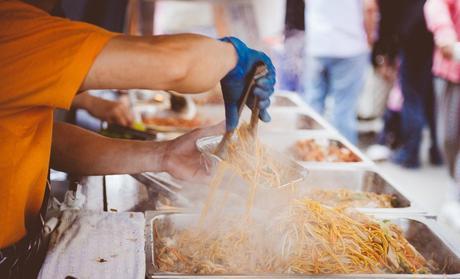

FSSAI is an independent body which is recognised under the Ministry of Health & Family Welfare, Government of India. The FSSAI has been established under the Food Safety and Standards Act, 2006 which consolidates various acts and orders related to food safety and regulation in India. FSSAI aims on laying down standards for food items and to regulate their manufacture, storage, distribution, sale and import to ensure availability of safe and wholesome food for human consumption.
An online application launched by Food Safety and Standards Authority of India is Food Licensing & Registration System (FLRS) to facilitate Food Business Operators (FBO) in India to apply for License/Registration Certificate and track their applications during the course of processing.
Why anyone starting a food business in India needs FSSAI License?FSSAI License or Food License is applicable to all the people, who manufacture store, distribute food and it is also applicable to restaurants and street food vendors irrespective of whether it is small, medium and large operators. Thus, Food License is applicable to all the peoples who conduct the business as food operators.
In an effort to regulate the food industry, the FSSAI Act prescribes a number of penalties and offenses for contravening. If one need to actually build their food premises then one needs to register as a food business by applying for a licence and registration with FSSAI to avoid penalty and to match with the standards of food safety.
If any person or food business operator, himself or by any person on his behalf who is required to obtain licence, manufacturers, sells, stores or distributes or imports any article of food without licence, shall be punishable with imprisonment for a term which may extend to 6 months and also with a fine which may extend to 5 lakh rupees.
Any person who, for human consumption sells or distributes or imports by himself or by any other person on his behalf, any food items for human consumption which is not safe, and where such failure or contravention results in death, then such person shall be punishable with imprisonment for a term which shall not be less than 7 years but which may extend to imprisonment for life and also with fine which shall not be less than 10 lakh Rupees.
The Adjudicating Officer or the court may also order for cancellation of licence, re-call of food from market, forfeiture of establishment and property in case of grievous injury or death of consumer and issue prohibition orders in other cases.
Operators who has not obtained food license or have not registered themselves under FSSAI may face the consequences of paying fines and imprisonment, and their property can also be confiscated. If one has a brand with hard earned name and recognition, has been caught operating an unlicensed food business which can ruined their reputation by generating negative publicity. Punitive measures vary by situation and location, but at the very least one will be told to close until one obtains the proper permits and license.
Thus, it is advisable to not operate food business without license or else the local health department of the particular city will shut down your business.
What are the consequences if you open a business without a food license?A business caught operating without a license could be forced to cease operations. Not having a business license is illegal and depending on the industry, location and depth of licensing requirements it is considered as legal violation of the act which implies penalties
If one conducts the business without a license, and a customer decides he is not pleased with the product or service offered to him, he can sue in small claims court, using fraud as one reason for the lawsuit. The point is that doing business without a license is a fraudulent act. If the business is found liable, and if the customer is successful in their lawsuit, then the company is responsible for the damages in regards to the fraudulent activity.
If a business is caught operating without a license, this can cast doubt on the business ability to conduct business in an ethical or competent manner. Customers could draw a conclusion that if the business did not follow procedures to operate legally, they might not follow customer directives either which may result in loss of reputation.
There may be instances when a customer takes a legal action against the restaurant in case of food poisoning, allergic reactions etc. and the FSSAI license provides a cushion for them in such cases, as it is proven that the food outlets is certified to sell food items and follows certain instructions and standardized process and products. However, on serious allegations and complaints even food license cannot save one from legal actions, and at the same time, FSSAI may cancel the license. Therefore, care must be taken at all times to maintain the quality of food at your restaurant.
Hence, getting a business license can be a tedious process, especially if more than one license or permit is required for the industry. But the amount of work and effort to attain the licenses is worth it in the end. The penalties for operating a business balance the inconvenience of attaining a license.
How a FSSAI License can impact your food business?Most of the restaurants, food outlets, packaged food and beverages put their logos on the menu to make their customers aware of their FSSAI registration. And this logo depicts the trust and validity of the product that it is safe to consume. Logo of FSSAI with license number placed rightly on menu, boards or pamphlets can help food outlets increase their business. There a lot of unorganized food business which do not have FSSAI license, and if your food business is certified by authority which will attract more customers.
Most of the new food outlets and restaurants avoid the taking FSSAI License to save the money and to avoid the hectic process of documentation in the early days of business. However, the procedure is quite simple, and there are a lot of legal consultancies which can help in getting FSSAI with an ease at nominal fees as compared to the penalties or fines that have to be paid to the authority later for not having a license. To avoid the later unintended consequence, one should get its FSSAI license with other valid permissions before officially opening the food outlet.
For those who are opening the restaurant for the first time, or starting a new outlet must possess food license not just because of legal formalities and avoid fines or penalties but get accepted among consumers. Most of the people will perceive the food outlet or restaurant as a brand if the restaurant is certified by the Food Standard and Safety Authority of India. At the early stage of operations, it is very hard to market or make people aware of your restaurants. But with FSSAI logo the new food outlet would be widely accepted by the new customers. The new food business operators can also use FSSAI logo on their bills and packaging for home delivery to attract more customers, which will further enhance the relationship with customers.
If one is already a renowned restaurant or food outlet and one wants to replicate its success in a different area of the same state then one can use their existing food license. Also, if one want to go big and open a chain of outlets in a different state of the country then one have to get a central license from FSSAI.
In today's world, getting big ticket businesses and corporate events aren't easy for any restaurant or food outlet due to their strict and tight regulations. Apart from the registered tax number at the state level and central level, many corporations require food licenses from FSSAI. So, FSSAI registration is as significant as the other essential papers and legal forms. So it is more than a necessity than a need of just getting a permission of operating the business serenely.
FSSAI expects that every food outlet and restaurant that is certified under the authority should follow certain rules, procedures, and process to maintain a standard and hygiene in the kitchen. Moreover, the guidelines from FSSAI helps the food business owners to acquire standard raw materials and grocery which further gives assures quality food.
For instance, the case related to Maggi noodles ban effect - FSSAI issues order on defying monosodium glutamate (MSG) related norms. FSSAI alleged on famous noodle brand Maggi for the extreme lead content. Due to which later, many small or big food outlets and restaurant chains were raided on the grounds of food adulteration and hygiene. After this case, many food outlets rushed for their registrations and while some of them improved their kitchens and outlets.
Thus, Food License is one of the mandatory License to carry on the food business in India. So if one could offer delicious food which is tailored to each person's custom nutritional requirement it will be awesome and the business shall grow manifolds.

